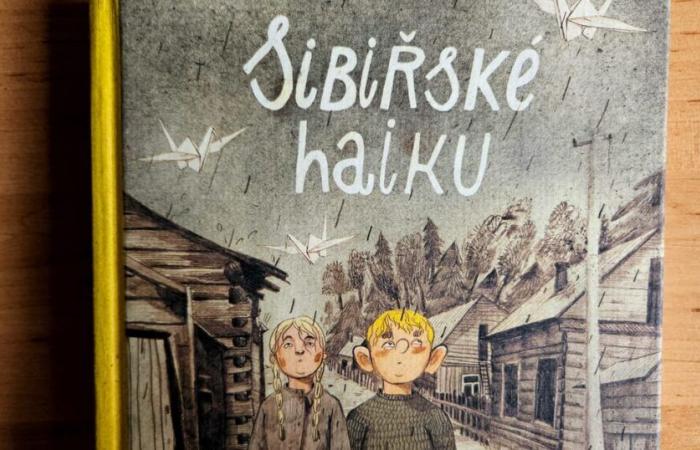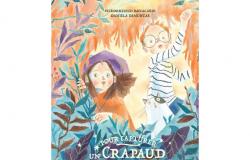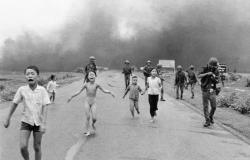Deportations of Lithuanians in 1941
Jurga Ville|Photo: Loreta Vašková, Radio Prague Int.
With his graphic novel, Jurga Vilé reopens a painful chapter in Lithuanian history. In 1941, the Soviets deported some 43,000 Baltic citizens and forced them to live in inhumane conditions in Siberia. Among the deportees was also the family of Jurga Vilé's father. This dark page of relations between the Soviets and the Lithuanians which should have been forgotten, therefore resurfaces in a book whose form and drawings by Lina Itagaki make it accessible and understandable to young readers. For Jurga Vilé, it is the culmination of a long process of research and discoveries:
Photo repro: Jurga Vilé, Lina Itagaki, 'Siberian haiku'/Argo
“It is our common experience, the collective memory that brings us together. It took me a long time to learn more details about our family history, although I never considered writing a book. I read books about exiles from the age of 13. They were difficult and complicated books, screaming books that were born out of pain and the inability to talk about them. First of all I was distraught. What my father said to me when I was little was quite vague probably because he wanted to protect me. He told me stories from his childhood as if they were rather funny adventures. »
Victims of Stalinist terror
Photo repro: Jurga Vilé, Lina Itagaki, 'Siberian haiku'/Argo
The tragic fate of the Lithuanian deportees is told in the book by a boy who loves adventure and does not at first understand what is happening, why his entire family is expelled from his country and what his fault was. He doesn't understand why they find themselves in Siberia. In this book, the vicissitudes of the gulag prisoners are seen through the eyes of a child who often does not realize their tragic dimension. It is up to the reader to guess what lies beneath the naive observations of a small deported child. To create the character of Algis, Jurga Vilé drew a lot of inspiration from her father's experiences:
“At that time, my father was younger than the little hero of the book of which he is a model. He was only three years old when he was deported and did not return to Lithuania until he was eight. The protagonist of my book is eight years old when he has to leave his homeland and returns home at thirteen. We moved him up in age because we needed a more active hero. My father was embarrassed by this change, he couldn't accept the fact that we were writing a book which was not only documentary and where there was also a part of our imagination. »
Photo repro: Jurga Vilé, Lina Itagaki, 'Siberian Haiku'/Argo
A miraculously preserved notebook
Life in the camp is unbearable. No weakness is tolerated. The cold, the hunger, the hard chores, the brutality and the cynicism of the Russian supervisors can only be tolerated by strong individuals who do not allow themselves to be completely demoralized by the situation which seems to have no way out. And yet in this camp which is the overwhelming image of human misery, people seek and find the means to survive. And some even still discover the strength to come together, to sing together, to help each other, to love each other and to be kind to others. This is the case of Algis' grandmother who wrote a diary during this period, a precious document which will survive to this day and will give Jurga Vilé a lot of information about camp life:
Photo repro: Jurga Vilé, Lina Itagaki, 'Siberian Haiku'/Argo
“Although I read a lot of documents, my grandmother's notebook was very important to me, especially because it concerned my family. There were many episodes from my father's life and also my grandmother's deep feelings. Her descriptions touched me extremely because she spoke about her experiences differently and paid a lot of attention to the characters and friendliness of the people she met. This gave me the impetus to write a book that is not like my grandmother's notebook but which allowed me to transmit the light that I found in her narration. »
'Siberian Haikus'|Photo repro: Jurga Vilé, Lina Itagaki, 'Siberian haiku'/Argo
The Japanese story line
Photo repro: Jurga Vilé, Lina Itagaki, 'Siberian Haiku'/Argo
Near the Lithuanian camp there is a Japanese prison camp. Soon a complicity was established between the prisoners of the two camps which allowed them to overcome the differences of culture and language. The two parties observe each other, sympathize, learn to make origami and, thanks to a Lithuanian woman who has some knowledge of Japanese, exchange short poems written on small pieces of paper in the form of haikus, this kind of Japanese poetry which expresses sensations with very few words. This is therefore one of the reasons why Jurga Vilé titled her book Haiku of Siberia but what was decisive for the choice of this title was her grandmother's notebook:
Photo repro: Jurga Vilé, Lina Itagaki, 'Siberian haiku'/Argo
“The word 'haiku' was inspired by my grandmother's tiny notebook whose text was written with a simple pencil and whose cover was lost or perhaps never existed. In the text there are many passages which have been erased but their content is clear. The notebook deeply moved me and the word 'haiku' came to mind. I realized that so many profound things can be said with very few words. Later, another Japanese line of the story was also added and we finally find in the book a whole skein of Japanese motifs. »
'Siberian Haikus'
The main message
'Siberian Haikus'
Little Algis lives and grows up in a world that is hostile to him and sets dangerous traps for him. His father was separated from the family and died in another camp, but he is surrounded by three women, his grandmother, his mother and his sister, who seek to protect him. In this region at the end of the world, frozen for most of the year, he learns to appreciate every little change, every little event that breaks the crushing monotony of his existence. His life cannot be more modest and humble, death lurks around him and sometimes strikes the people close to him, but he does not sink into despair because he has learned to rejoice in the simplest things and discovered the benefits of human fraternity. It is this image of a boy who did not let himself be destroyed by misfortune that Jurga Vilé wanted to evoke in his book:
“The main message that I would like to convey to young readers is that one must not give in to weakness, that one must face difficult situations, maintain one's inner courage, preserve and respect a deep faith and inspire others . »
'Siberian Haikus'






